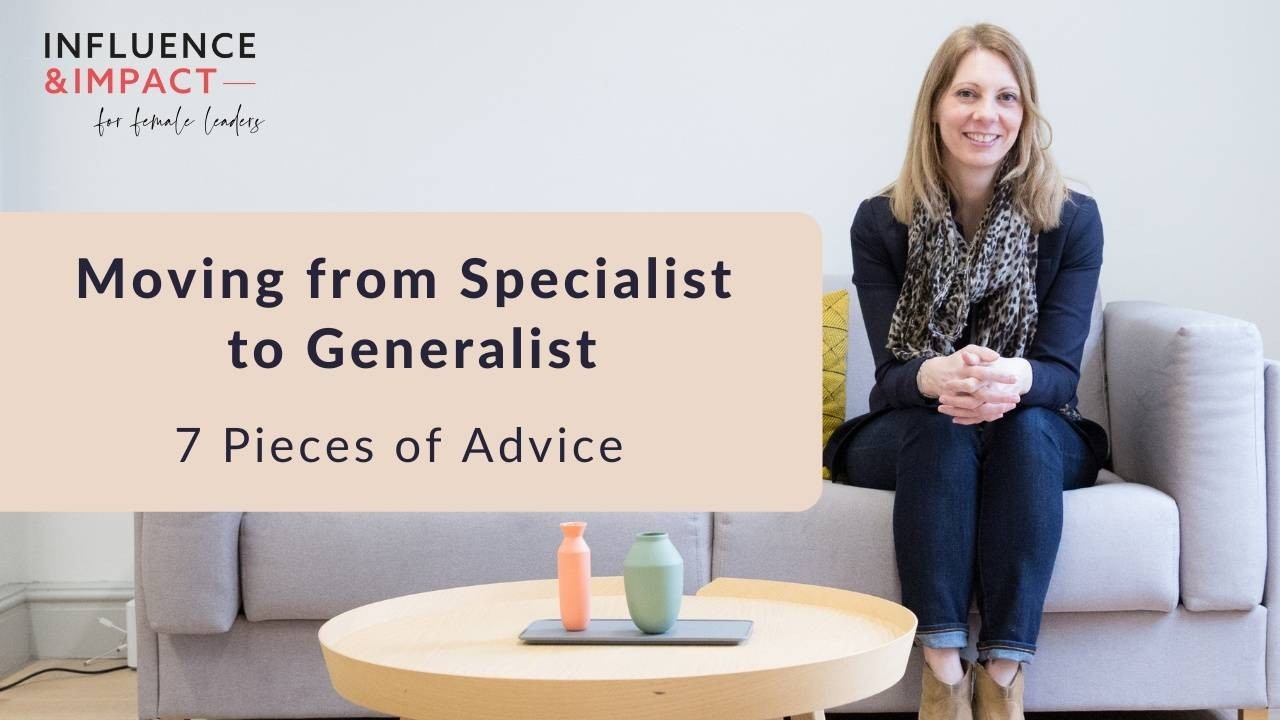Moving from Specialist to Generalist – 7 Pieces of Advice

As you develop your career and become more senior, there’s a good chance that you’ll move from being a specialist to a generalist.
In a typical office environment, many of us start off in a generalist role as an assistant or coordinator, helping the team with anything and everything.
As you progress you become more specialised and when you reach management or head of level, you’re an expert in your area.
But then the time comes when you move above that level and instead of just managing people from your specialism, you find yourself having to lead, manage and trust people from different specialisms. All who know more about their areas than you do.
This transition from successful specialist to a successful generalist can be difficult to navigate.
The more senior you are, the more important this transition becomes. After all, a great Chief Executive is the ultimate generalist!
Here are 7 short pieces of advice to help you succeed when you step up into a generalist role…
1: Start with Mutual Respect
Come from a place of mutual respect and trust with your direct reports. Start with the assumption that both of you are really good at your jobs. This builds instant trust and means you don’t need to prove yourself by trying to know absolutely everything straight away.
Don’t fake it ‘til you make it. You'll build more credibility by being transparent about what you do and don't know.
2: Be Great at Asking Questions
You don’t need to have all the answers, make every decision or solve all of the problems. In fact, as you move into a generalist position, this won’t always be possible. Make it your focus to get great at asking questions.
This is about being a sounding board rather than a saviour. Which takes us on to my third piece of advice.
3: Have a Coaching Approach
Try to change your style of leadership from directive to coaching. Coaching is a powerful way of helping others to think about situations or challenges differently and I think all leaders should have it within their toolkit.
There are lots of great courses out there about how to coach as a leader.
4: Set Boundaries
Just because the people you manage know more about their area than you do, it doesn't mean they can do what they want with no accountability!
Make it clear that you are held responsible for everything they do and need to understand it all so you can answer upwards and support them where needed. This isn’t about micromanaging. You can agree with each person what you need to know, how often you need an update and in what format.
5: Have Clear Objectives and KPIs
Set these together with the people you’re managing. You want to be able to check-in and see that they're making progress. If they're not achieving these, then you need to be able to problem solve with them to identify what the issue is and what support they need.
Without objectives or KPIs, you won’t be able to keep them accountable or step-in to support when needed.
6: Advocate
This is probably what your team is going to need from you more than anything.
Your ability to navigate internally to get them the resources they need, influence on their behalf, get the decisions made they need and ensure they get the profile and recognition they deserve.
Have a conversation and ask them what they need from you in terms of advocacy and influence.
Don’t forget to feed back when you are championing them. You might advocate for them in meetings but if they're unaware, they can feel unsupported.
7: Be Aware of your Biases
Be conscious of your biases towards different areas, specialisms or ways of working. This is particularly important if you’re still managing your own specialism. It can be incredibly demotivating to have a manager who doesn’t take an interest in your area or favours others over you.
Take interest and responsibility in all areas you’re managing and make an effort to learn new areas or styles of working. Ask the specialists you’re managing some of the key things you need to know and learn them – you might even like to do a short course on it!
To be a great generalist you need to be less concerned about knowing everything and having all the answers and instead focus on openness, trust and support.
Listen to the full episode on the Influence & Impact podcast on Carla’s website, Apple, Spotify or Stitcher
For more articles on the issues that impact women leaders at work follow Carla Miller on LinkedIn
Find out about the various ways Carla works with women leaders and organisations on her website www.carlamillertraining.com

